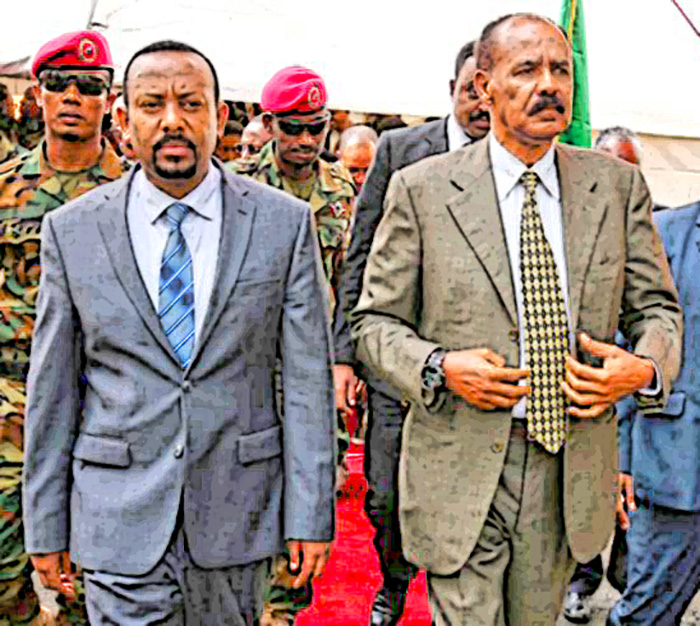
Unexpected consequences of the Tigray Ethiopian conflict may be making Isaias Afwerki rethink his decision to commit military forces in support of the Ethiopian National Defense Force. The war has brought about changes in the relationship with not only Ethiopia but also the Arab states and Sudan. Rather than securing his position of power, Afwerki may have weakened his position.
Why did Isaias Afwerki, dictator of Eritrea, enter the Tigray Ethiopian conflict? Some say it was to permanently crush his long term adversary the Tigray Peoples Liberation Front. Others say it was to create a new partnership with Ethiopia that would bolster the Eritrean economy. However these explanations overlook the evil genius that has allowed Afwerki to survive since his rise to power in 1991.
It is now known that Eritrea has a debt burden of $3.87 billion with one of the poorest poor capita incomes of $587 annually. Over 45% of its food needs need to be imported for the population of only a little over 3 million. Almost every professional has left the country. There is a minimal health care and university system which combined with one of the most repressive governments, often compared with North Korea, which limits potential for development.
For the past few years Eritrea has sought to gain income from mining interests. It gave 60% interest to Chinese mining companies to develop and export gold, copper, zinc, and more recently has been looking at potash. Loans in excess of $300 million are in default to Arab states with the largest to Qatar . Bloomberg reports that in fact Qatar interests have filed suits in American courts to reclaim losses from Eritrean assets in foreign banks. The large Bina Mine had been built and run by the Canadian company, Nevsun. But a lawsuit on behalf of Eritrean workers was allowed in the Canadian courts leading to a settlement which revealed that workers at the mine were basically slaves. The Canadian interest except for a bout 10% was sold to the Chinese company, Zijin, in 2020.
The friendliness of Arab interests to finance the high cost of the Chinese partnership is waning fast. Eritrea had hoped to gain Arab favor and forgiveness by allowing Arab military ports and airbases to support their efforts in the Yemen conflict in which they fighting a proxy war against Iran. However the Arabs definitely see a conflict of interest as they have sided with Egypt and Sudan against Ethiopia in the rapid filling of the Grand Renaissance Dam. No doubt they expected Afwerki to be speaking loudly in support of the Arab united view rather than being mute.
The United States and United Nations have clearly not wanted to alienate the delicate relationship they have with the Arab alliance. Clearly pressure from the United States played a role in the withdrawal of United Arab Emirates forces out of Eritrea and the use of their assets by Afwerki. The United States and Western democracies have been recognizant of Egyptian interests towards the use of the Nile River no doubt seeing Middle East interests of importance.
For Afwerki economic realities which must be taking priority more than any concern about “friendship” with Abiy Ahmed. Afwerki has a keen sense of survival. No doubt he was surprised by the resurgence of the Tigray Defense Force, the growing world condemnation of the Ethiopian “law enforcement action” with its associated atrocities, and finally by its unforeseen consequence of economic chaos in Ethiopia which will not help Eritrea.
Recent transport of gold reserves by high ranking Prosperity Party officials of Ethiopia to Dubai as well the maintenance of secrecy about what is exactly contained in the document of the peace agreement between Ethiopia and Eritrea are raising new questions. Is it likely that Abiy Ahmed is in fact been making payments to Afwerki for his mercenaries to function in Ethiopia? Now that the Ethiopian state is at risk and its resources depleted is Afwerki rethinking his strategy. If the payments or promises of payments have stopped then reasonably one would expect Eritrea to disengage.
Afwerki based upon the promises of Abiy Ahmed never expected that the Tigray Defense Force would resurge to threaten his own survival. Now that there is beginning to be realignment of Sudanese interests with Tigray interests and the fact that the Khartoum is the now with the Sudanese government’s blessing the headquarters of opposition to the Eritrean government. Before the Tigray conflict Afwerki had been wooing Sudanese interests after a long history of distrust. Perhaps this is another reason Afwerki may be deciding he may need to withdrawal to protect his own interests.

